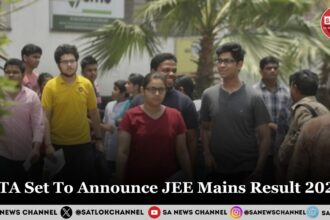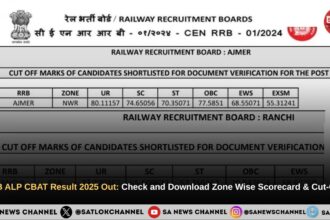India’s middle class, once considered the symbol of steady, salaried living, is standing on shaky ground.
- Key Points related to “Jobless Future” for India’s Middle Class
- Corporate Growth, but Jobless Expansion
- Millions Looking for Jobs, Few Getting Hired
- Gig Economy: The New Job Market
- AI and Automation: Job Creator or Job Killer?
- Government’s Response to Job Challenges
- What It Means for India’s Middle Class
- Adapt to Survive
- True Certainty Lies Beyond This World
- FAQs on “Jobless Future” for India’s Middle Class
Top investment expert Saurabh Mukherjea, founder and CIO of Marcellus Investment Managers, has cautioned that traditional corporate jobs are disappearing fast, and the middle class must prepare for a “jobless future.”
In a recent podcast, Mukherjea said that India’s largest and most profitable companies are growing revenues and profits without adding significant headcount. He suggested that this phenomenon is indicative of a lasting change in the job market.
Key Points related to “Jobless Future” for India’s Middle Class
- The advancement of white-collar jobs has decreased from 11% prior to 2020 to approximately 3% after the pandemic.
- Each year, nearly 8 million fresh graduate students come into the job market of India.
- India’s gig workforce is expected to reach 2.35 crore by 2030.
- Automation and AI are replacing repetitive white-collar roles.
- The government has announced a ₹1 trillion incentive plan to create 3.5 crore jobs by 2027.
Corporate Growth, but Jobless Expansion
Mukherjea explained that large firms like HDFC Bank, Bajaj Finance, Asian Paints, Titan, and Infosys are expanding rapidly but not creating proportional employment opportunities.
He noted, “Companies are scaling up without hiring more people, that’s the new reality.”
Data from Marcellus Investment Managers backs his view: India’s organized white-collar job creation rate has collapsed from 11% before FY20 to just about 3% now.
The deceleration is permanent, and it shows the transition which is taking place in these three industries, the banking, insurances, and manufacturing, where human workers are being replaced by automation, AI and digital tools.
Millions Looking for Jobs, Few Getting Hired
Every year, 80 lakh graduates join India’s workforce. But corporate hiring hasn’t kept pace. According to NITI Aayog (2025), India’s service sector added nearly 4 crore jobs in the last six years, but most were low-paying, contract-based or informal roles.
Also Read: Popcorn Brain Syndrome: How Constant Screen Time Is Silently Rewiring Young Minds Across India
Mukherjea believes this imbalance is dangerous for the middle class: “Educated youth are coming out of colleges faster than the economy can create jobs for them.”
Gig Economy: The New Job Market
As traditional employment stalls, gig and freelance jobs are filling the gap.
The gig workers force in India is expected to grow from one crore in 2024-25 to 2.35 crore during 2029–30 as per a government report.
The Economic Times report of 2024 presented a staggering 92% increase in blue-collar gig employment, primarily attributed to logistics, e-commerce and delivery services such as Zomato, Blinkit, Amazon and Swiggy, among others.
Mukherjea believes this is India’s future: “We are entering a world where people will earn through gigs, small businesses, and projects rather than fixed monthly salaries.”
Thanks to India’s digital public infrastructure, including Aadhaar, UPI, and ONDC — the country is well-positioned to support this flexible, self-driven workforce.
AI and Automation: Job Creator or Job Killer?
While AI adoption could boost India’s GDP by $600 billion by 2035 (as per NITI Aayog), it also poses a threat to millions of white-collar jobs.
Recent restructuring at tech giants like TCS shows how AI is replacing repetitive functions such as data processing, customer service, and operations.
Mukherjea sounds the alarm that the consequences will not be the same for all, the productivity will go up, but the number of employees will not increase. Society’s white-collar workers need to undergo training anew to be retained in the AI-dominated environment.
Government’s Response to Job Challenges
In order to solve the issue of unemployment, the government implemented a ₹1 trillion employment-linked incentive scheme in July 2025, with the target of creating 3.5 crore jobs by 2027.
The project pays attention to the labor-intensive industries such as textiles, renewable energy and electronics. But, on the other hand, specialists inform that a major part of the new jobs will be created through the usage of gig platforms and startups rather than the traditional corporate structure.
What It Means for India’s Middle Class
The middle class, built on stable corporate jobs, is facing a paradigm shift.
Mukherjea’s message is clear: the time of permanent employment has ended. In contrast, the labor force of India has to accept adaptation, self-employment and never-ending upskilling as the new normal.
Experts suggest the following:
- Acquire digital and AI proficiencies to be able to compete.
- Obtain multiple sources of income by means of freelancing or starting a business.
- Practice financial discipline in order to cope with varying income.
- Consider lifelong learning as an investment instead of expecting job security for a long time.
As Mukherjea puts it, “The middle class must learn to build, not just to apply.”
(News source: Economic Times)
Adapt to Survive
India’s employment future is being rewritten. Automation, AI and gig work are completely changing the way of making money for the people of India. To millions of middle-class families, the caution from Saurabh Mukherjea is not a prophecy but rather a guide.
The sooner they adapt to this new reality of skill-based, flexible work, the better their chances to thrive in the “jobless” economy ahead.
True Certainty Lies Beyond This World
In this 21-Brahmand (universes) of Kaal Brahm, everything, from jobs to relationships to life itself, is uncertain and temporary. The constant fear of losing stability, wealth, or identity is the very design of this material world. No amount of technology, AI, or education can give lasting security here. According to the divine knowledge of Sant Rampal Ji Maharaj, true certainty begins only when one turns toward Satlok, our eternal home, where the Supreme God Kabir Saheb Ji resides.
Sant Rampal Ji Maharaj discloses that Sat-Bhakti, the genuine method of worship which He has revealed and is based on the holy scriptures of all religions, is the only way to reach the divine abode Satlok. He has granted His guidance through which one can liberate oneself from the unending cycle of birth, death and suffering imposed by Kaal Brahm.
In a world where even jobs and economies are unstable, only the spiritual path of Sant Rampal Ji Maharaj leads to permanent peace, prosperity, and liberation, a life beyond uncertainty, in the eternal abode of God. To know more about the true spiritual knowledge you must visit:
Sant Rampalji ji Maharaj YouTube channel.
FAQs on “Jobless Future” for India’s Middle Class
1. What was the warning given by Saurabh Mukherjea?
Ans. He cautioned that the middle class of India is going to live in a “jobless future”, as the companies are making the profits without the need to increase their staff because of automation and AI.
2. What makes India’s middle-class society a risk?
Ans. Hiring by corporations has fallen from 11% to 3% since 2020, with many white-collar jobs being taken over by machines.
3. What will be the size of India’s gig economy in 2030?
Ans. The number of workers in India’s gig economy is expected to be 23.5 million in 2030, driven mainly by the rise of companies like Swiggy and Amazon.
4. What steps is the government taking to counter job losses?
Ans. In 2025, the government implemented a job plan worth ₹1 trillion aimed at creating 35 million jobs across various industries by 2027.
5. What does Sant Rampal Ji Maharaj state about the uncertainty of life?
Ans. He says, nothing is permanent in Kaal Brahm’s Lok neither career, wealth nor life. The real serenity can only be attained by going to Satlok through Sat-Bhakti of Supreme God Kabir Saheb Ji.









